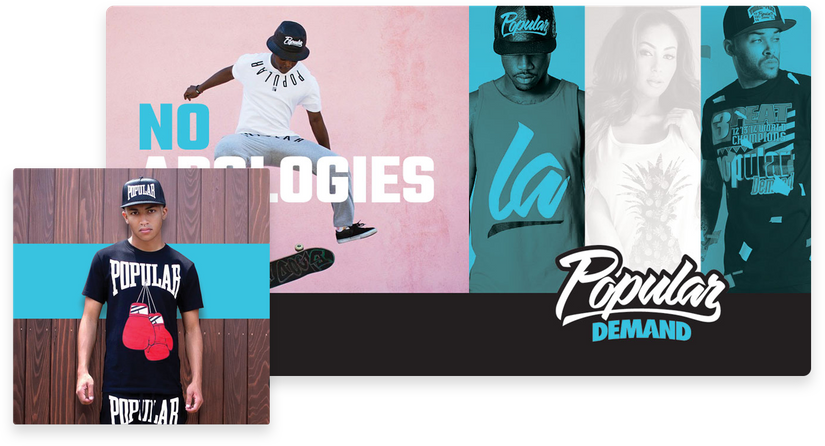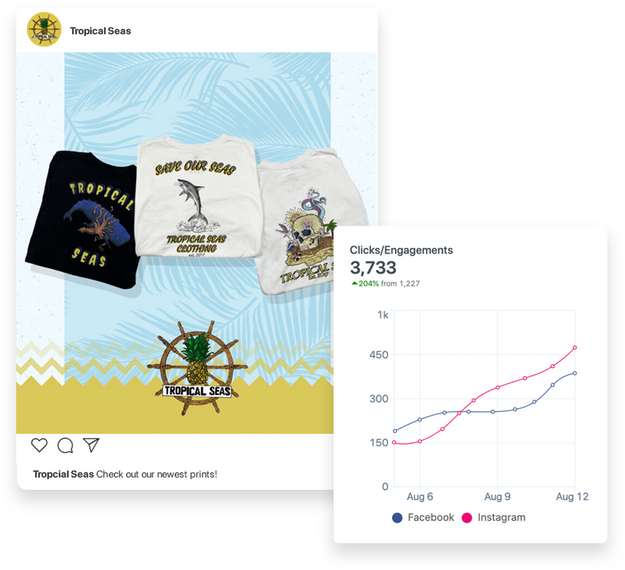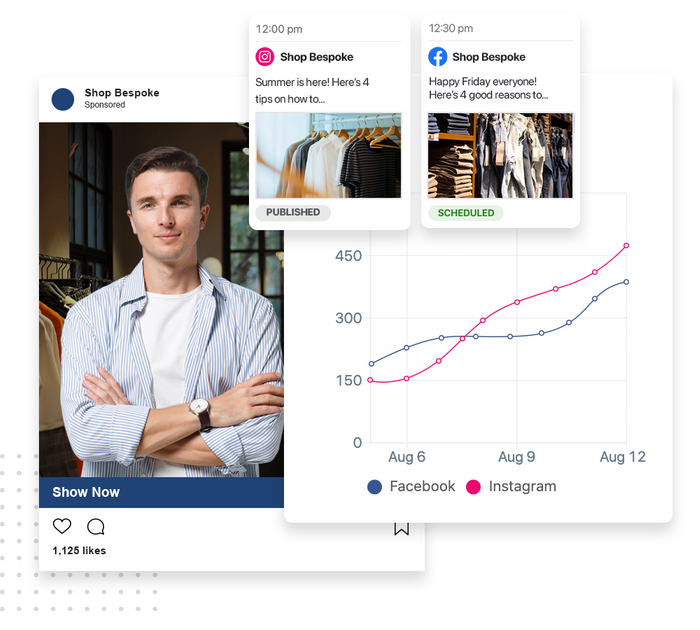Retail Social Media
#1 Marketing Platform® for Retail Stores
- Marketing
- SEO & Content
- Social Media
- Websites
- Platform
Build local trust and awareness with social marketing for retail stores
Get more customers by building local trust and awareness with our social media marketing program for retail stores — stand out in your community.
Why retail stores need social media management
With so much competition online and offline, retail stores need to have a visible presence wherever their customers are spending the majority of their time. These days, social media is that place.
An effective social media management strategy for retail stores can help you increase brand awareness and visibility, build strong community connections and, ultimately, drive customers and sales for your store.
To get the most out of social media, retail stores need to post regularly, engage with their audience, launch targeted social media ads, monitor and adjust their performance, and more. It’s a lot of work, but it’s well worth the effort.
We can help you master social media management
7 benefits of social media management for retail stores
1. Increase brand recognition
Social media management can help increase brand recognition for retail stores. By creating and managing social media accounts for a retail store, businesses can create a consistent brand identity that can be easily recognized by potential customers. This can help attract new customers and increase sales.
2. Build community connections
Build community connections for your retail store with social media management. By engaging with customers, local businesses and followers on social media, businesses can create a sense of community and connection with their customers. This can help build loyalty and repeat business.
3. Showcase your expertise
The right social media management strategy can help retail stores showcase their expertise. By sharing content and engaging in conversations on social media, businesses can demonstrate their knowledge and expertise in their industry. This can help build trust and confidence with potential customers.
4. Humanize your retail store
Sharing the human side of your brand can help to make your retail store more memorable. By sharing stories, photos and videos of your team, customers and store on social media, you can show the personality of your brand and make it more relatable. This can help build a connection with your customers and make them more likely to shop with you.
5. Drive traffic to your retail store website
Social media management can help increase website traffic for retail stores. By sharing links to a retail store’s website on social media, businesses can drive traffic to their site. Driving traffic to your retail store’s website from social media can lead to increased sales and revenue for your business.
6. Get to know your customer base
Social media management can help retail stores get to know their customer base. By analyzing the demographics of your social media followers, you can learn more about who your customers are and what they are interested in. This information can be used to tailor your marketing and sales strategies to better meet the needs of your target audience.
7. Win customers and sales
By providing valuable content and engaging with potential customers on social media, retail stores can win customers, drive sales and grow. Through social media, retail stores can nurture these valuable relationships and can convert social media followers into paying customers.
The best social media platforms for retail stores
Google Business Profile
When someone does a local search for a retail store, you want to make sure that you show up at the top of the results. Being active on Google Business Profile can help. To get started, claim your business listing and make sure all of your information is accurate and up-to-date. Then, start sharing photos, videos and other content that showcases your store.
Facebook
Facebook is a great platform for retail stores because it's a popular social media platform for people of all ages. Create a Facebook Page for your store, and fully populate it with key information, such as your hours, location, contact information and product offerings. From there, make sure to regularly share content that will be of interest to your target audience.
LinkedIn
LinkedIn can be a great platform for retail stores to connect with other businesses in their industry. By creating a LinkedIn Page for your store, you can share information about your products and services, as well as articles and other content that will be of interest to other businesses. You can also use LinkedIn to find and connect with potential employees.
Instagram
Instagram is a visual social media platform that's popular with younger audiences. Make the most of Instagram marketing for your retail store by using the right hashtags. In addition, take advantage of Instagram Stories and Instagram Live to share behind-the-scenes content and give your followers a peek into the day-to-day operations of your store.
YouTube
YouTube can be a powerful marketing tool for retail stores. By creating and sharing videos about your store, products and services, you can reach a wider audience and build interest in your business. You can also use YouTube to create how-to videos, product demos and other types of content that can be helpful for your customers.

How to make your retail store's social media profiles stand out
Choose the right profile picture
Your profile picture is one of the first things that potential customers will see when they come across your social media profile, so you want to make sure it's a good one. Choose a high-quality photo that accurately represents your brand. For example, if you're a clothing store, you may want to use a photo of your storefront or a model wearing your latest collection.
Write an engaging bio
Your social media bio is another important element of your profile. This is your chance to give potential customers a snapshot of what your store is all about. Keep it short, sweet and to the point. Use keywords and hashtags to help people find your profile, and include a call-to-action to encourage people to follow you.
Ensure brand consistency
When creating and managing social media accounts for your retail store, it's important to ensure brand consistency. This means using the same colors, fonts, logo and overall aesthetic across all of your social media platforms. This will help create a cohesive brand identity that can be easily recognized by potential customers.
Use relevant keywords
When creating content for your social media profiles, be sure to use relevant keywords. This will help ensure that your content is seen by people who are searching for information about your store or products. In addition, using relevant keywords can help you to appear in search engine results when people are looking for information about your business.
Establish a voice for your online store
When creating content for your social media profiles, it's important to establish a voice for your store. This means creating content that is consistent with the overall tone and identity of your brand. For example, if your store is known for being fun and quirky, your social media content should reflect that.
Post high-quality content
When sharing content on social media, it's important to post high-quality content. This means using high-quality images, videos and written content. Avoid posting low-quality content, as this can make your store look unprofessional, or only posting promotional content that will quickly get boring to your followers.
Engage with your audience
Social media is all about engagement. When you're managing social media accounts for your retail store, it's important to regularly engage with your followers. This means liking and commenting on their posts, as well as responding to any questions or comments they have. By engaging with your followers, you can build relationships and customer loyalty.
Use social media management software
A big part of effective social media management for a retail store is staying active and posting regularly. That can be difficult when you’re already a busy store owner. With social media management software, like the Marketing 360® Social app, stores can stay active and save time by scheduling out social media content in advance.

What to post on social media for retail stores
Retail store updates
One of the best things to post on social media for retail stores is store updates. This can include information about new products, sales and promotions, store events and more. By sharing updates on social media, you can keep your customers and followers in the loop about what's going on at your store.
Educational content
A great way to provide value to your social media followers is to post educational content. For a retail store, this can include blog posts, infographics, videos and more. Sharing this type of content on social media can help to build trust and confidence with potential customers by demonstrating your knowledge and expertise in your industry.
Promotions
Running a promotion is a great way to increase sales and attract new customers. When promoting a sale or special offer on social media, be sure to include all of the relevant details, such as dates, times, discounts and more. You can also use social media to promote contests and giveaways.
Answers to FAQs
Another helpful type of content to share on social media for retail stores is answers to FAQs. This can help to save you time by providing customers with the information they need without having to contact you directly. In addition, it can help to build trust and confidence with potential customers by demonstrating your knowledge and expertise.
Customer feedback and reviews
Customer feedback and reviews can be a wonderful way to show potential customers that your store is reputable and trustworthy. You can share positive customer feedback and reviews on your social media profiles, as well as post photos and videos of customers enjoying their shopping experience.
Relevant news stories
Sharing relevant news stories on social media can help to keep your followers informed about what's going on in your industry. This can also help to start conversations and engage with your followers. When sharing news stories, be sure to include your own commentary and analysis to show your followers that you're an expert in your field.
Industry memes and humor
Memes and humor can be a fantastic way to engage with your followers, add some personality to your social media profile and make your brand more memorable. However, it's important to make sure that the content you're sharing is appropriate for your brand and will not offend your followers.
We can help you create great social media content
Social media management FAQs for retail stores
Why is social media management important for retail stores?
Social media management is important for retail stores because it can help increase brand recognition, build community connections, showcase your expertise and humanize your brand. Additionally, social media management can help you get to know your customer base, win leads and customers, and make your retail store stand out in your community.
How do you create an effective retail store social media strategy?
When creating a social media strategy for your retail store, it's important to start by setting goals and objectives. Once you know what you want to achieve, you can create content and engagement strategies that will help you to reach your goals. Additionally, it's important to establish a budget for your social media efforts and to create a schedule for posting.
What are the rules retail stores need to follow on social media?
There are a couple of things retail stores should always keep in mind on social media. First, it's important to remember that anyone can see what you post on social media for your retail store and to make sure that you always keep it professional. You should also make sure to follow the guidelines on the platforms you're using.
How often should a retail store post on social media?
There is no hard and fast rule for how often a retail store should post on social media. It depends on what your goals are, which platforms you’re using, who your audience is and more. However, it's generally recommended to post at least once a day, or a few times a week, to keep your followers engaged.
Tour Retail Marketing
Get everything you need to manage and grow your business.
Plus, explore free account tools. No credit card required.




